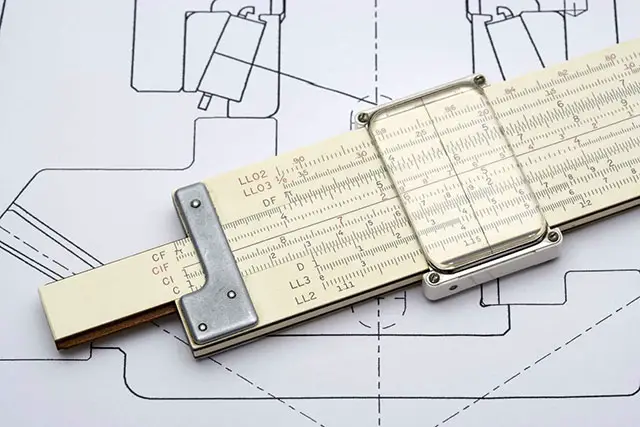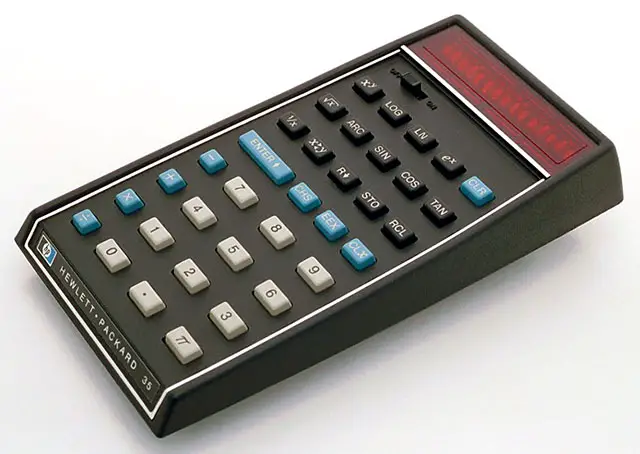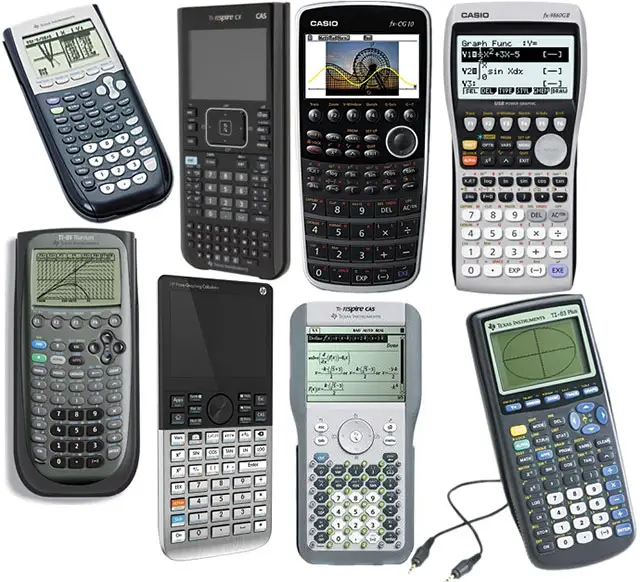HISTORY OF THE CALCULATOR
A calculator is a device or tool that performs arithmetic operations such as addition, subtraction, multiplication and division. It's designed to make
mathematical calculations easier and more efficient, reducing the need for manual calculation and the risk of errors.
The history of calculators dates back to ancient times, with the use of devices such as the abacus. Over the centuries, the concept of the calculator
evolved, leading to the development of mechanical calculators in the 19th century and the advent of electronic calculators in the 20th century. Today,
calculators come in a wide range of forms, from handheld devices to software programs and are used by people from all walks of life.
This article will delve into the rich history of calculators, from their origins to the present day. It will examine the various types of calculators,
their evolution and their impact on society. It will also provide a detailed look at the key moments in calculator history and the people who made them
possible. We hope to give the reader a comprehensive understanding of this history and the significance of calculators in general.
Early Calculators
The earliest calculators were mechanical and relied on gears, wheels, rods and other mechanical parts to perform basic mathematical operations. In this
section, we examine the world of early calculators and explore the inventions that paved the way for today's electronic calculators. From Napier's Bones to the
Pascaline and the slide rule, each device has its unique story of invention, evolution and impact on society. So come along with us as we explore the
fascinating history of early calculators!
Abacus
 The earliest known calculator was the abacus, invented by the ancient Babylonians around 2400 BC. The abacus consisted of a wooden frame with horizontal rods
on which beads were strung. These beads could be moved to represent numbers, and simple arithmetic operations could be performed using the beads. The abacus was
widely used throughout the ancient world, including China, where it was known as the "suanpan," and Japan, where it was known as the "soroban." For centuries,
it served as the primary tool for performing mathematical calculations until the invention of more advanced calculators.
The earliest known calculator was the abacus, invented by the ancient Babylonians around 2400 BC. The abacus consisted of a wooden frame with horizontal rods
on which beads were strung. These beads could be moved to represent numbers, and simple arithmetic operations could be performed using the beads. The abacus was
widely used throughout the ancient world, including China, where it was known as the "suanpan," and Japan, where it was known as the "soroban." For centuries,
it served as the primary tool for performing mathematical calculations until the invention of more advanced calculators.
Napier's Bones
Napier's Bones was a manual calculating device invented by Scottish mathematician John Napier in 1617 and was another early form of a calculator. This device
consisted of a set of rods with numbers engraved on them, which could be used to perform multiplication and division by arranging them in a specific way.
Napier's Bones represented a significant step forward in the evolution of calculators and paved the way for developing more sophisticated devices.
Calculating Clock
In 1623, German mathematician and philosopher Wilhelm Schickard designed the first mechanical calculator. It was called the "Calculating Clock" and could
perform addition and subtraction. However, the design was never built due to the difficulty of manufacturing the gears at the time.
Pascaline
Soon after, in 1642, French mathematician and philosopher Blaise Pascal built the first successful mechanical calculator, the Pascaline. The Pascaline was a
rudimentary calculator that could perform addition and subtraction using a system of gears and dials. However, it was incapable of performing multiplication or
division and was also extremely expensive and difficult to build, making it impractical for widespread use. Despite these drawbacks, it was a significant step
forward in the history of the calculator. Although the Pascaline was a considerable advancement over earlier calculators, it was still limited in its abilities
and was primarily used by merchants and scientists.
Leibniz wheel
In 1673, the German mathematician and philosopher Gottfried Wilhelm Leibniz improved upon Pascal's design and invented the Leibniz wheel, which could perform
multiplication and division as well as addition and subtraction. This was the first calculator that could perform all four basic arithmetic operations.
Slide rule
Another early calculating device invented in the 17th century was the slide rule. This consisted of two logarithmic scales on a ruler-like device that could
be used to perform complex mathematical calculations with high precision by sliding one ruler relative to the other. Slide rules were widely used by engineers
and scientists until the advent of electronic calculators in the 1970s.
Arithmometer
The next significant advancement in calculator technology came in the 19th century with the invention of the "arithmometer." Invented in 1820 by French
mathematician Charles Xavier Thomas de Colmar, the arithmometer was the first practical and affordable mechanical calculator. It could perform all four basic
arithmetic operations and was much easier to use than the Pascaline. The arithmometer was a huge success and was widely used in Europe and the United States for
many years.
Later developments
Various other mechanical calculators were invented in the late 19th and early 20th centuries, including the "Comptometer" and the "Dalmation." However, these
calculators were still limited because they were mechanical devices and therefore prone to errors and breakage.
Comparison of early calculators
Despite their differences, all of these early calculators shared several essential features. They were all mechanical devices that relied on physical
manipulation to perform calculations. They were also limited in their capabilities compared to modern calculators, and they were primarily used by professionals
such as merchants, scientists and engineers. Despite these limitations, early calculators represented a significant step forward in the evolution of mathematical
technology and paved the way for developing more advanced devices.
Electronic Calculators
The introduction of electronic calculators marked a turning point in calculation history. Before the invention of electronic calculators, mathematicians and
scientists relied on mechanical calculators, slide rules and abacuses to perform complex calculations. The development of electronic calculators significantly
improved the speed, accuracy and ease of calculations.
The first electronic calculators
- IBM 608
In 1954, IBM introduced the first all-transistor calculator, the "IBM 608". This calculator used solid-state transistors instead of vacuum tubes and was
housed in several large cabinets.
- ANITA
Soon after, in 1961, the first all-electronic desktop calculator called the "ANITA MK-8" was released by the Bell Punch Co. of Great Britain. ANITA, or "A
New Inspiration to Arithmetic", was a desktop device that used vacuum tubes to perform basic arithmetic operations. It was a significant advancement over
previous calculating devices, but it was still relatively large and expensive.
- Busicom 141-PF
The Busicom 141-PF was another early electronic calculator introduced in the same year as ANITA. This calculator was also programmable and capable of
performing arithmetic calculations.
The introduction of handheld electronic calculators
- Cal Tech
In 1967, Texas Instruments (TI) introduced the first handheld calculator called the "Cal Tech". This calculator weighed 45 ounces, featured a small keyboard
with 18 keys, and used a thermal printer to display the results. Further development of the Cal Tech led to the commercial Pocketronic calculator, released by
Canon in 1970 in Japan and 1971 in the United States.
- Texas Instruments TI-2500 Datamath™
Subsequently, in 1972 TI began selling calculators under its own name and released the revolutionary single-chip TI-2500 Datamath™ calculator. It was a huge
success and sparked a calculator war between Texas Instruments and competitors like Hewlett-Packard. This competition led to the development of more advanced
and affordable calculators.
 Sharp EL-805
Sharp EL-805
In 1973, Sharp released the EL-805, the first pocket-sized calculator to use a Liquid Crystal display (LCD). This calculator was very portable and allowed
users to perform calculations on the go.- Hewlett-Packard HP-35
HP-35 was another handheld electronic calculator that was introduced in the early 1970s. This calculator was considered one of the first true scientific
calculators capable of performing advanced calculations such as logarithms and trigonometric functions.
Advancements in electronic calculators
-
Improved design and functionality
Since the introduction of electronic calculators, there have been numerous advancements in the design and functionality of these devices. Calculators have
become smaller, more compact and more powerful, with the ability to perform complex calculations such as matrix operations, statistical functions and
financial calculations.
-
Integration with computers
Electronic calculators have also been integrated with computers, allowing users to transfer data between their calculator and computer. This has enabled
users to perform more advanced calculations and analyze data in new ways. Additionally, electronic calculators have been integrated with software programs
and applications, enhancing their capabilities and versatility.
Modern Calculators
The introduction of electronic calculators paved the way for the development of modern calculators. With the advancements in technology, the use and design
of calculators have undergone a tremendous transformation, leading to the creation of specialized calculators suited for various fields such as finance, science
and engineering. This section examines the world of modern calculators, exploring their unique features and capabilities. From the graphical calculators that
have revolutionized mathematical visualization to scientific calculators that perform complex computations with ease to the convenient and easily accessible
online and app-based calculators, the choices available for users today are vast and varied. Join us as we explore the marvels of modern calculators and
understand their role in our lives.
Graphing Calculators
Graphing calculators are advanced calculators designed to plot and analyze mathematical functions. They are equipped with high-resolution screens that can
display graphs and charts in great detail, making them valuable tools for students and professionals in STEM fields. Many graphing calculators also have
built-in programming capabilities, allowing users to write and execute custom programs to perform a range of tasks.
Scientific Calculators
Scientific calculators are designed for complex mathematical calculations, such as logarithms, trigonometry and exponential functions. They are typically
equipped with specialized functions and buttons for solving problems in various scientific fields. They often have a two-line display that shows both the
calculation and the result. Scientific calculators are widely used in schools, colleges and universities and are also popular among professionals in scientific
and engineering fields.
Financial Calculators
Financial calculators are designed for solving financial problems and analyzing financial data. They typically have functions for calculating loan payments,
interest rates, amortization and other financial metrics, making them a valuable tool for business professionals, investors and financial planners. Many
financial calculators also have features for performing more advanced financial calculations, such as the time value of money and cash flow analysis.
Programmable Calculators
Programmable calculators are advanced calculators that allow users to write custom programs and macros to perform complex calculations. They often have
powerful processors, large memories and a full-color touch screen, making them capable of running advanced applications and solving complex problems.
Programmable calculators are widely used in engineering, finance and other technical fields and are also popular among hobbyists and students interested in
programming and mathematics.
Online and App-Based Calculators
Online and app-based calculators are digital calculators that can be accessed through a web browser or a mobile app. For example, you can find our free online
calculators here. These types of calculators offer a wide range of functions and features, from simple arithmetic to complex financial and
scientific calculations. Online and app-based calculators are convenient and accessible, making them a popular choice for students, professionals and casual
users. Many online and app-based calculators also offer advanced features, such as real-time collaboration and cloud storage, making them versatile and powerful
tools for solving complex problems.
Comparison of Modern Calculators
Each type of modern calculator has its strengths and weaknesses, making it essential to choose the right one for your specific needs.

- Graphing calculators are ideal for students and professionals in STEM fields, offering advanced graphing and programming capabilities.
- Scientific calculators are best for solving complex scientific problems and are widely used in schools and universities.
- Financial calculators are essential for business professionals, investors and financial planners, providing powerful financial analysis tools.
- Programmable calculators are versatile and powerful tools for solving complex problems in engineering, finance and other technical fields.
- Online and app-based calculators are convenient and accessible, making them a popular choice for students, professionals and casual users.
Impact of Calculators on Society
The advent of calculators has transformed society, revolutionizing how we approach mathematical problems and calculations in various aspects of our lives.
From education and business to science and engineering, calculators have proven invaluable tools that have changed the game. In this section, we look at the
impact calculators have had on society, exploring how they have influenced different fields and impacted our everyday lives. It can be surprising to
realize the extent to which calculators have reshaped the world as we know it.
Education
Calculators have significantly impacted education, particularly in mathematics and science. In the past, students were required to perform complex calculations
by hand, which could be time-consuming and prone to error. With the advent of electronic calculators, students can now perform calculations quickly and
accurately, freeing up more time for understanding and problem-solving. This has allowed for a deeper exploration of mathematical and scientific concepts,
leading to a better understanding of the subjects.
Business and Finance
Calculators have also revolutionized the business and finance industries. From balancing a checkbook to performing complex financial calculations, calculators
have made it easier and more efficient for individuals and businesses to manage their finances. With the integration of calculators into computers and other
digital devices, financial information can now be easily stored, analyzed and shared, streamlining processes and enabling faster decision-making.
Science and Engineering
In the fields of science and engineering, calculators have been instrumental in the development of new technologies and innovations. Scientists and engineers
use calculators to perform complex calculations and simulations, helping them to better understand and design new products and systems. With technological
advancement, modern calculators can now perform advanced calculations and simulations, allowing for a deeper exploration of scientific and engineering
concepts.
Everyday life
Finally, the effect of calculators on everyday life has also been significant. From helping with home finances to enabling people to perform complex
calculations on the go, calculators have made daily life easier and more convenient. With the increasing availability of online and app-based calculators,
individuals now have access to powerful calculation tools from anywhere, at any time.
Overall, the evolution of calculators has dramatically affected society, changing how we learn, work and live. Whether through education, business and
finance, science and engineering, or everyday life, calculators have become an integral part of our world, helping us better understand and solve complex
problems. They have made complex mathematical calculations easier, faster and more accurate, freeing us from the limitations of manual computation and enabling
us to tackle bigger and more complex problems. They have also played a crucial role in shaping the course of human civilization by facilitating advancements in
technology, science and commerce.
Future of Calculators
Despite the rapid advances in computing technology, calculators continue to play a vital role in our lives and their future looks bright. The development of
more powerful, feature-rich and portable calculators will only continue, making them increasingly accessible to people of all ages and backgrounds. With the
advent of the Internet, the potential for online and app-based calculators to transform the way we use these tools is immense and we can expect to see a new era
of innovation in the field of calculators in the coming years. Whether you're a student, a professional, or simply someone who loves mathematics, the future of
calculators is something to look forward to.
Conclusion
The evolution of calculators from the abacus to modern-day devices is a testament to human ingenuity and the drive for convenience and accuracy in
mathematical calculations. The journey of the calculator has been fascinating, with each iteration bringing new capabilities and advancing our ability to solve
complex mathematical problems. Today, the calculator has become an indispensable tool for students, scientists, engineers and business professionals, providing
quick and precise answers to complex calculations.


 The earliest known calculator was the abacus, invented by the ancient Babylonians around 2400 BC. The abacus consisted of a wooden frame with horizontal rods
on which beads were strung. These beads could be moved to represent numbers, and simple arithmetic operations could be performed using the beads. The abacus was
widely used throughout the ancient world, including China, where it was known as the "suanpan," and Japan, where it was known as the "soroban." For centuries,
it served as the primary tool for performing mathematical calculations until the invention of more advanced calculators.
The earliest known calculator was the abacus, invented by the ancient Babylonians around 2400 BC. The abacus consisted of a wooden frame with horizontal rods
on which beads were strung. These beads could be moved to represent numbers, and simple arithmetic operations could be performed using the beads. The abacus was
widely used throughout the ancient world, including China, where it was known as the "suanpan," and Japan, where it was known as the "soroban." For centuries,
it served as the primary tool for performing mathematical calculations until the invention of more advanced calculators.

